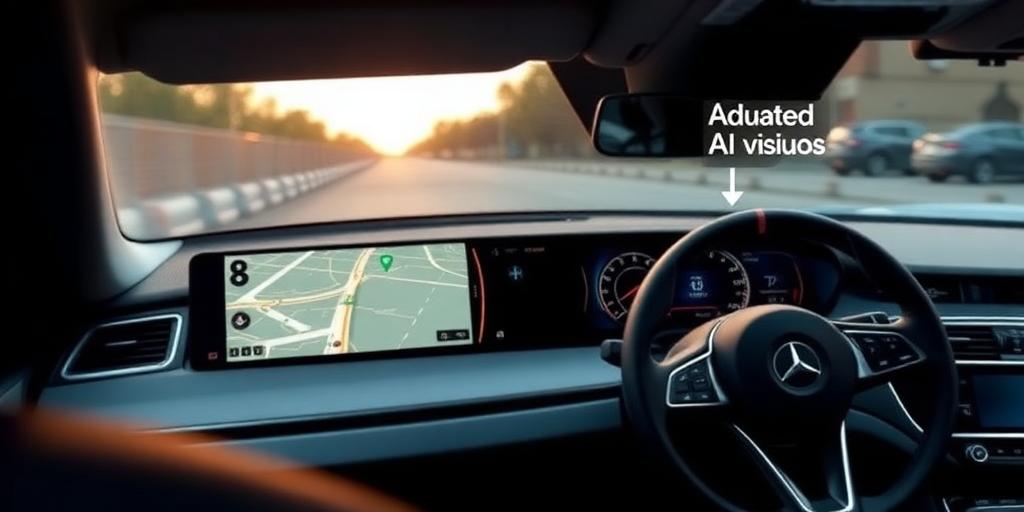The Indelible Role of AI in Modern Cars
Artificial Intelligence (AI) has moved from the realm of science fiction to an integral component of modern automotive technology. Its impact is pervasive, influencing everything from vehicle performance and safety to the overall driving experience. This article delves into the multifaceted role of AI in contemporary vehicles, exploring its applications and implications.
Enhanced Driver-Assistance Systems (ADAS)
One of the most visible applications of AI in modern cars is in Advanced Driver-Assistance Systems (ADAS). These systems leverage AI algorithms to provide a safer and more convenient driving experience.
- Adaptive Cruise Control (ACC): AI algorithms enable vehicles to maintain a safe following distance by automatically adjusting speed based on the traffic conditions. This reduces driver fatigue and enhances safety on highways.
- Lane Keeping Assist (LKA): AI-powered LKA systems use cameras to monitor lane markings and provide corrective steering inputs to prevent unintentional lane departures, thereby mitigating the risk of accidents.
- Automatic Emergency Braking (AEB): AEB systems employ AI to detect potential collisions and automatically apply the brakes if the driver fails to respond in time. This can significantly reduce the severity of accidents and even prevent them altogether.
Autonomous Driving
AI is the cornerstone of autonomous driving technology, which promises to revolutionize transportation. Self-driving cars rely on a complex network of sensors and AI algorithms to perceive their surroundings, make decisions, and navigate without human intervention.
- Perception: AI algorithms process data from cameras, radar, and lidar sensors to create a comprehensive understanding of the vehicle's environment. This includes detecting and classifying objects such as other vehicles, pedestrians, and traffic signs.
- Decision-Making: AI algorithms use sophisticated decision-making models to plan routes, avoid obstacles, and respond to unexpected events. These algorithms are trained on vast amounts of data to ensure safe and efficient navigation.
- Control: AI systems control the vehicle's steering, acceleration, and braking systems to execute the planned maneuvers. This requires precise and reliable control algorithms to ensure smooth and safe operation.
Improved Vehicle Performance and Efficiency
AI also plays a crucial role in optimizing vehicle performance and efficiency. By analyzing data from various sensors, AI algorithms can fine-tune engine parameters, optimize fuel consumption, and improve overall vehicle dynamics.
- Predictive Maintenance: AI algorithms can analyze data from vehicle sensors to predict potential maintenance issues before they occur. This allows for proactive maintenance, reducing downtime and extending the lifespan of the vehicle.
- Energy Management: In electric vehicles (EVs), AI algorithms optimize energy consumption by intelligently managing battery usage and regenerative braking. This extends the driving range and improves the overall efficiency of the vehicle.
Enhanced In-Car Experience
Beyond driving-related functions, AI is enhancing the in-car experience by providing personalized and intuitive services.
- Voice Assistants: AI-powered voice assistants allow drivers to control various vehicle functions using natural language commands. This enhances convenience and reduces driver distraction.
- Personalized Recommendations: AI algorithms can analyze driver preferences and habits to provide personalized recommendations for music, navigation, and other services. This creates a more enjoyable and tailored driving experience.
Challenges and Considerations
While the benefits of AI in modern cars are undeniable, there are also challenges and considerations that need to be addressed.
- Data Security and Privacy: AI systems collect and process vast amounts of data, raising concerns about data security and privacy. Robust security measures and privacy policies are essential to protect sensitive information.
- Ethical Considerations: Autonomous driving systems must make ethical decisions in complex and potentially dangerous situations. This requires careful consideration of ethical frameworks and the development of transparent decision-making algorithms.
- Regulatory Frameworks: The rapid advancement of AI technology necessitates the development of comprehensive regulatory frameworks to ensure safety, security, and ethical use of AI in the automotive industry.
Conclusion
The role of AI in modern cars is transformative, enhancing safety, performance, and the overall driving experience. From advanced driver-assistance systems to autonomous driving and personalized in-car services, AI is reshaping the automotive landscape. As AI technology continues to evolve, its impact on the automotive industry will only grow, paving the way for a future of safer, more efficient, and more enjoyable transportation.









